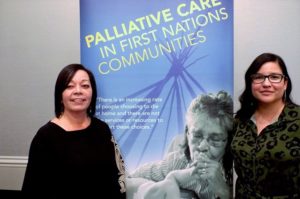Framework for Anishinabek approach to palliative care developed for North Shore Tribal Council communities

By Rick Garrick
THUNDER BAY— A presentation on the development of a culturally safe palliative care model for the North Shore Tribal Council communities was featured at the Teaming Up for Whole-Person Care conference in Thunder Bay.
Edith Mercieca, director of Community Support Services with N’Mninoeyaa Aboriginal Health Access Centre, and Joanna Vautour, research and development coordinator with Maamwesying North Shore Community Health Services, delivered the Innovative or Reclaiming our Anishinabek Approach to Palliative Care presentation on Oct. 25.
“The catalyst for us to develop a palliative care model for our communities was the experience that our families were having with their loved ones who had passed in hospital, and it wasn’t always a good experience,” Mercieca says. “We do know that families wanted to bring their loved ones home and to care for them there, so we had to look at how do we do this in our communities.”
Mercieca says the communities do not currently have funding for the palliative care model.
“So we are constantly looking for funding to actually deliver the service,” Mercieca says. “What we do is we use our current resources and we wrap services around individuals who are requesting as we work to try and get funding either from Health Canada or from the province. I think we are getting close, but no commitment at this time.”
Mercieca says the Teaming Up for Whole-Person Care conference, held Oct. 24-25 at Delta Hotels, was a reminder of all the work they have done as well as the work they still need to do.
“The resources that were in this room were amazing,” Mercieca says. “We’ve made a lot of notes on what we have to bring back to ensure that we’ve addressed all the gaps in what we are trying to develop.”
Vautour says the development of the palliative care model was guided by the Improving End-of-Life Care in First Nations Communities research project workbook that was developed by Lakehead University’s Mary Lou Kelley and a number of co-investigators including Holly Prince, a Red Rock Indian Band citizen, and Chris Mushquash, a Pays Plat citizen, along with four partner First Nations, three in Ontario and one in Manitoba.
“They developed recommendations on how to improve palliative care that came from the community,” Vautour says. “It came from the people, it had culture, it had our traditions [as] a part of that, so it was relevant to other First Nation communities like ourselves to follow that model that they established.”
The Teaming Up for Whole-Person Care conference opened with a keynote presentation on The Ontario Palliative Care Delivery Framework: Delivering What Our Patients Need by Robert Sauls, interim clinical co-lead for the Ontario Palliative Care Network.
“It describes care from identification, assessment of needs, developing the team, having conversations with patients and families, developing a plan and then delivering on the plan, and then at some point, managing end of life care and bereavement,” Sauls says about the framework. “So what we described is what’s involved in each of those steps, but described it in a way that isn’t like a prescription. We more or less described it as a way that any community can take this and say, ‘Okay, how can we do this in a way that works best in our community, builds on the strength that we have, that matches our resources?’ We released this in April of this year and what we’re hearing is this actually resonates well around the province.”

